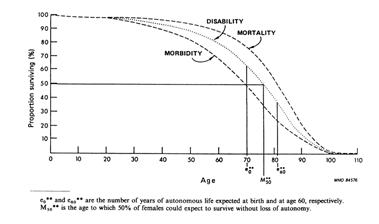What are health expectancies?
What are the health expectancies?

Figure from WHO, 1984:
Total, disease-free, disability-free survival
curves
Life expectancy at old ages has been increasing for several
decades. This gives rise to questions about the health
status of the population. The World Health Organization
declared in its 1997 World Health Report that "increased longevity
without quality of life is an empty price. Health expectancy is
more important than life expectancy".
Health expectancy is a general term referring to the entire
class of indicators expressed in terms of life
expectancy in a given state of health. Health expectancies are
indicators of current health and mortality conditions. As many
health expectancies exist as health measures (disease, disability,
perceived health, or other concepts). Disability-free life
expectancy, chronic disease-free life
expectancy, life expectancy in good perceived
health, are the health expectancies the most often met in
the literature.
Regular calculation of health expectancies allows measuring
the evolution of the health status of a population when
life expectancy increases and indicates whether the years of life
gained are years in good or bad health.
For further information click on "how to interprete trends? " in the box
